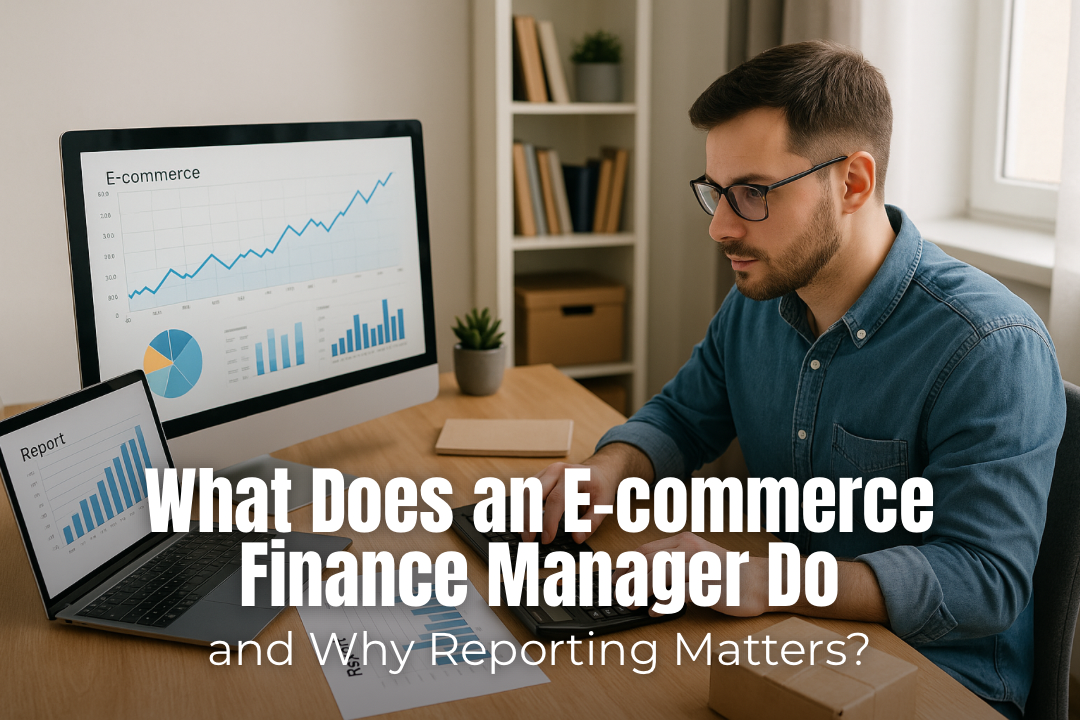Why reporting is the backbone of growth
E-commerce companies live and die by numbers: revenue, ad spend, inventory, margins. Yet in many businesses, these numbers are scattered across spreadsheets, marketplaces, and accounting software — never forming a clear picture.
That’s why founders often feel like they’re “driving blind.” The reports they see are either too late, too general, or too disconnected from reality. The missing piece? A financial manager in eCommerce who builds reliable reporting systems and turns raw data into decisions.
What makes eCommerce reporting different
Unlike traditional retail, online businesses deal with constant complexity:
-
Marketplaces like Amazon, Walmart, eBay, Shopify each have different reporting formats.
-
Payout delays distort cash flow visibility.
-
Advertising spend (Amazon PPC, Meta Ads, Google Ads) can fluctuate daily.
-
Multi-currency transactions make it hard to see true profitability.
-
Returns and chargebacks complicate revenue recognition.
A standard accountant can record transactions, but only a financial manager in eCommerce knows how to consolidate these moving parts into a single, reliable system.
The three essential reports
Every eCommerce founder should receive at least three management reports regularly:
-
Profit & Loss (P&L): shows actual profit after all costs, not just revenue. It includes marketplace fees, advertising, logistics, and refunds.
-
Cash Flow: predicts when money will actually be available, considering payout delays from Amazon or Shopify.
-
Balance Sheet: highlights the real value of the business — assets, liabilities, and equity.
A financial manager in eCommerce doesn’t just produce these reports — they explain what they mean for decisions today. For example: Should you reorder a product now or wait? Can you afford to increase ad spend next month?
From spreadsheets to automation
Early-stage companies often survive on Excel. But as soon as sales cross $1M+, manual spreadsheets become a liability: errors multiply, updates lag, and no one trusts the numbers.
A skilled financial manager in eCommerce:
-
Implements tools like QuickBooks, Xero, Zoho, or ERP integrations.
-
Automates data imports from Amazon, Shopify, and banks.
-
Builds dashboards in Excel or Google Sheets for real-time visibility.
-
Reduces dependency on manual inputs and eliminates costly mistakes.
Automation is not about making reports prettier — it’s about giving management access to numbers they can actually trust.
How better reporting changes decisions
Once reporting is structured, decision-making improves immediately:
-
Advertising: instead of guessing ROI, you see the exact profitability of campaigns.
-
Inventory: forecasts align with real demand, preventing overstock and stockouts.
-
Expansion: new markets or products can be evaluated with scenario modeling.
-
Financing: cash flow projections show if you need external funding and when.
A financial manager in eCommerce acts as a translator between numbers and strategy. They make sure every dollar spent (on ads, logistics, or hiring) contributes to growth — not chaos.
The impact of chaos on candidates
From recruitment practice, one fact stands out: the messier the company’s reporting, the harder it is to attract top finance professionals.
If a financial manager sees that they’ll spend 80% of their time fixing broken spreadsheets, their salary expectations rise — or they walk away. Many senior candidates even ask upfront:
-
Is there an accountant handling routine bookkeeping?
-
Are processes documented, or is it “start from zero”?
The more structured your reporting is, the easier it is to attract qualified talent without paying a “chaos premium.”
When to bring in reporting expertise
Some founders think they can delay professional finance until later. But waiting too long usually means expensive clean-ups. A good rule of thumb:
-
Up to $1M: outsourced bookkeeping may suffice.
-
$1M–$3M: part-time support can start building proper reporting.
-
From $3M: a part-time financial manager in eCommerce becomes necessary.
-
From $5M+: you need a full-time role to handle reporting, forecasts, and strategic planning.
Again, it’s not just about revenue — complexity of SKUs, suppliers, and sales channels often forces earlier hiring.
What skills matter most for reporting
When it comes to reporting and decision-making, these skills make the biggest difference:
-
Management accounting: P&L, cash flow, forecasting.
-
Software expertise: QuickBooks, Xero, Zoho, Sellerboard, ERP tools.
-
Data consolidation: ability to merge numbers from Amazon, Shopify, and banks.
-
Automation mindset: building dashboards that update automatically.
-
Strategic insight: connecting numbers to operational choices.
👉 Amazon experience is an advantage, but not mandatory. A strong financial manager in eCommerce with reporting expertise can usually master marketplace-specific nuances quickly.
Why reporting is an investment, not a cost
Hiring a financial manager in eCommerce for reporting may look like overhead, but the ROI is real:
-
10–20% savings on ad spend by cutting waste.
-
15–25% reduction in tied-up capital by optimizing inventory.
-
Faster, data-driven scaling decisions that prevent expensive mistakes.
Simply put: better reporting means better profits.
Final thoughts
Clear reporting is not about pleasing accountants or investors — it’s about giving founders control. A financial manager in eCommerce transforms disconnected data into insights that drive smarter decisions.
The earlier you build these systems, the faster your business can grow — and the more attractive your company becomes to top finance talent.
At Talents Boutique, we’ve seen how structured reporting changes everything: suddenly, founders stop asking “Where did the money go?” and start asking “Where should we invest next?” That’s the power of reporting done right.












